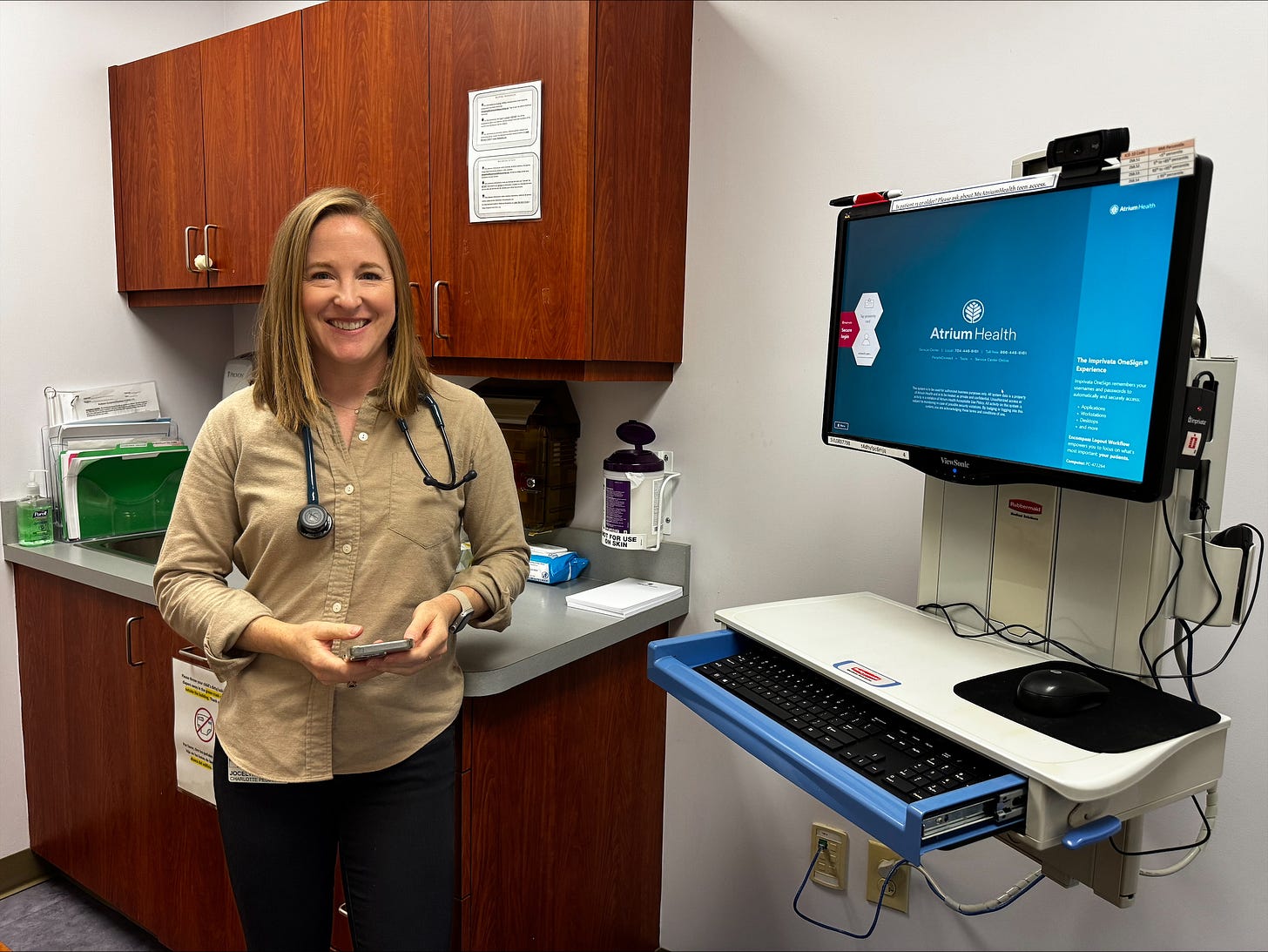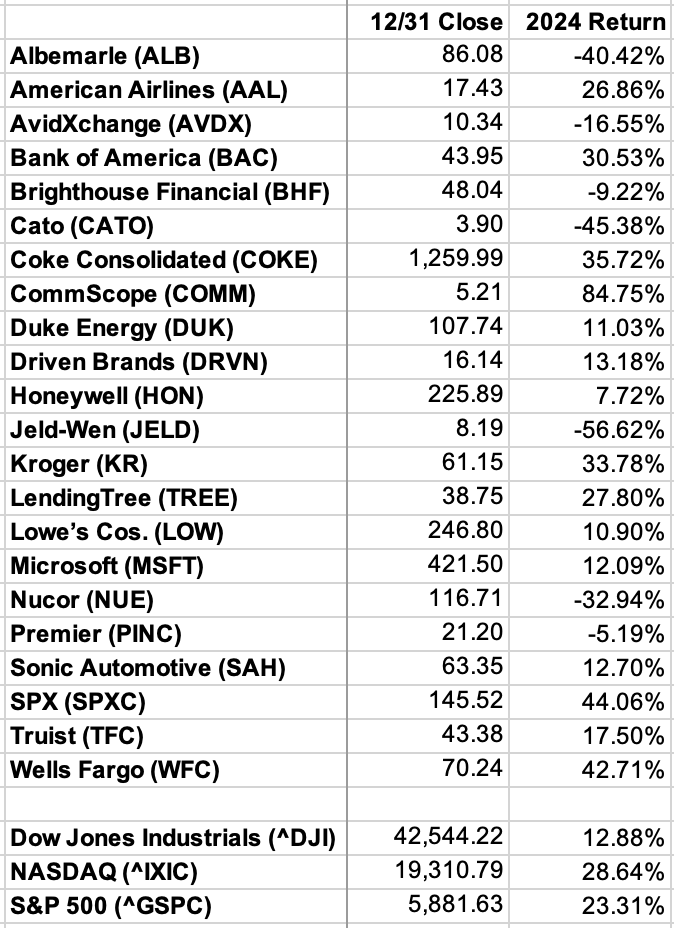Newsletter 1/6: AI could listen to your next doctor’s appointment
Plus: Top local stocks of 2024; Potential office tower for SouthPark?; Concerns over 'down-zoning' limits; New governor sworn in; Self-improvement email course; County commissioner DWI plea
Good morning! Today is Monday, January 6, 2025. You’re reading The Charlotte Ledger, an e-newsletter with local business-y news and insights for Charlotte, N.C.
Need to subscribe — or upgrade your Ledger e-newsletter subscription? Details here.
Today's Charlotte Ledger is sponsored by GraserSmith, PLLC:
Experience when you need it most.
At GraserSmith, we exclusively focus on providing personalized advocacy in family matters of divorce, child custody, child support, alimony, property division, and prenuptial agreements.
We also offer private mediation options to resolve your matters without unnecessary delay or costly litigation.
HOW ARTIFICIAL INTELLIGENCE IS TRANSFORMING HEALTH CARE:
An NC Health News/Charlotte Ledger series
Beginning today, a three-part NC Health News/Charlotte Ledger series explores how artificial intelligence is shaping health care in North Carolina. Look for the rest of the series later this week.
TODAY: Doctors are turning to “virtual scribes” to take notes, raising privacy concerns
PART 2: How North Carolina health care providers are harnessing AI
PART 3: How state regulators are approaching the use of AI in health care
—
More doctors are using artificial intelligence to record patient visits, saying the tools save time and allow them to focus on patients. Some patients and experts have concerns about privacy and accuracy.
Atrium Health pediatrician Jocelyn Wilson uses an artificial intelligence tool on her smartphone to record patient visits and generate clinical summaries. Because she no longer needs to take notes, Wilson said the technology allows her to engage more fully with her patients. (Photo courtesy of Atrium Health)
By Michelle Crouch
When pediatrician Jocelyn Wilson sees patients at Atrium Health Levine Children’s Charlotte Pediatrics, she begins each visit with a simple request: for permission to record the conversation.
The reason isn’t surveillance — it’s efficiency.
Like a growing number of doctors, Wilson uses an artificial intelligence tool that listens to her conversations with patients and transforms them into a clinical visit summary that she can review, edit and upload to a patient’s medical record in just a few minutes.
The goal? To allow doctors to spend less time doing paperwork and more time caring for patients.
“I've never really liked using the computer very much when I'm in the exam room … I just feel like I'm not very present,” Wilson said. “Now, I don't have to be writing anything down. I can make direct eye contact.”
She said the AI tool, known as DAX Copilot, is saving her more than an hour a day entering appointment details into patient medical records.
While health care systems are using AI in a variety of ways to reshape care behind the scenes, these “virtual scribe” tools are some of the most visible to patients — they bring AI directly into the exam room.
More than 1,500 Atrium Health doctors are licensed to use DAX Copilot, according to an Atrium spokeswoman. At least three other North Carolina systems — Novant Health, UNC Health and Duke Health — are using similar technology.
The platforms are similar to the AI tools that many other industries — from finance to marketing — have adopted to streamline tasks like note-taking and summarizing information.
The AI assistants are not perfect, however, and health care providers are grappling with some of the same challenges experienced in other industries. Research has shown that voice recognition programs don’t always understand people in racial minorities, people who speak English as a second language and people with speech disabilities. The tools can also misinterpret information or even fabricate responses — a phenomenon called “hallucination” — underscoring the need for doctors to review the summaries.
“It’s imperative to have a human in the loop to make sure that we’re properly evaluating these tools and making sure they are working for all different types of patients and doctors,” said Allison Koenecke, an assistant professor of information science at Cornell University, whose research uncovered problems with AI-generated medical notes.
Health care systems also need to address patient concerns about privacy and ensure that patients are told how the software works so they can make informed decisions about whether to participate.
What patients can expect
Atrium was the first health system in the country to test DAX Copilot — short for “Dragon Ambient eXperience Copilot” — a platform developed by Microsoft subsidiary Nuance. The software installs a secure app on doctors’ smartphones that does the recording.
Wilson tested an early version, which she described as “somewhat clunky.” But the latest iteration, she said, is incredibly accurate, and she has been using it consistently for the past few months.
Here’s how it works: Before Wilson walks into the room, she records a brief note about the patient and the reason for the visit.
Once inside, she introduces herself and explains the process, saying something like, “I have my phone with me today because it's helping me write my notes at the end of the day. If you’re OK with that, it’ll just sit here and listen to our conversation.”
So far, she said, no patient has declined.
Wilson then sets her phone down on the counter and doesn’t touch it again until she leaves and stops the recording. Within minutes, the software sends a visit summary to her computer for her to review and edit.
A cure for physician burnout?
In a perfect world, Wilson said, doctors would have time between appointments to update their notes while the details are fresh in their memories.
“But the reality is, sometimes you’re in a patient room longer than expected, and there are two or three more patients waiting to be seen,” Wilson said. “And when you’re five or six patients in and haven’t started any of (your notes), that internal pressure starts to build. You’re anxious you’ll forget something, stressed about how long it’s going to take to catch up.”
Wilson said DAX Copilot has drastically reduced the stress of unfinished notes. Instead of staring at a blank screen, she now has a draft summary waiting for her.
“It’s a lot easier to edit a note than it is to start a note,” Wilson said.
Since she started using the technology, she said she has more time for lunch breaks and for exercising or cooking a meal in the evenings, rather than “writing notes right until it’s time to go to bed,” she said.
When the clinic is busy, DAX Copilot also allows her to squeeze more patients into her day, she said.
Burnout has become a crisis among physicians nationwide, with about half reporting symptoms in 2023, and a major culprit is the increasing burden of documentation. A 2020 Mayo Clinic study found that doctors spend one to two hours outside of the office writing up required notes from patient visits, cutting into personal and family time.
A study published in JAMA Network Open found that 47% of Atrium Health physicians using DAX Copilot reported a significant reduction in time spent doing documentation at home.
Privacy and accuracy concerns
About 70% of patients nationally are comfortable with physicians using AI in appointments, according to a 2024 survey. However, patients do have some reservations, the poll found, with just over half saying health care AI is “a little scary” and 70% expressing concerns about data privacy.
At a time when any phone or computer can be hacked, some patients worry about where a recording could end up. Atrium says the DAX Copilot app on physicians’ phones is accessible only through biometrics or password authentication, and recordings disappear after doctors approve the associated AI-generated clinical note.
When it comes to accuracy, it’s important for doctors like Wilson to carefully review the AI-generated content to ensure that it’s correct, Koenecke said.
Her research into one Microsoft speech-to-text tool revealed error rates twice as high for Black speakers as for white speakers. And when investigating a non-Microsoft model, she found instances where the technology omitted facts or fabricated content. In one case, for example, it invented a nonexistent medication called “hyperactivated antibiotics.”
As with many AI technologies, the success of these virtual scribes will likely depend largely on how they are implemented, Koenecke said. Will they be used to reduce the burden on physicians, with adequate time for screening and review? Or will hospitals deploy them to push physicians to see more patients and increase revenue?
Without adequate oversight, she said, the AI assistants could “lead to really massive downstream harms, especially for certain groups whose speech isn’t well captured by these tools,” Koenecke said. “How can we make sure these workers who are already overworked aren’t just skimming through and clicking ‘OK’?” —NC Health News reporter Emily Vespa contributed to this article.
Michelle Crouch covers health care. If you have tips or ideas for her, please shoot her an email at mcrouch@northcarolinahealthnews.org.
This article is part of a partnership between The Charlotte Ledger and North Carolina Health News to produce original health care reporting focused on the Charlotte area.
You can support this effort with a tax-free donation.
Today’s supporting sponsor is Landon A. Dunn, attorney-at-law in Matthews:
Charlotte foodies mourn the loss of two businesses: Sur La Table at SouthPark, Fenwick’s in Eastover
Two longtime and well-known fixtures of Charlotte food are closing: Sur La Table, known for its kitchen gadgets and cooking classes at SouthPark Mall since 2003; and Fenwick’s, a restaurant with a devoted following that opened in Eastover in 1984.
◼️ Sur La Table final day is Jan. 25: The closing of the national cookware retailer’s SouthPark location is posted on the company’s website, and an employee who answered the phone on Saturday said items in the store are currently 20% off. Its final day will be Jan. 25. Over the years, the store hosted cookbook signings for celebrity chefs like Paula Deen and Emeril Lagasse and carried high-end kitchen equipment as well as tableware, fun cooking gadgets and cookbooks. The company filed for bankruptcy protection in 2020. The Ledger’s Cristina Bolling has the full article, which is posted on our website.
◼️ Fenwick’s to end 41-year run in March: In a Facebook post on Saturday, Fenwick’s owner Don Rabb said it is time to retire after 41 years in business on Providence Road in Eastover. He’s 84. His wife, Catherine, died in 2021. “it's simply not been the same without her guiding spirit,” he wrote. He said the restaurant will close in March. The Charlotte Observer has a full article.
January is a traditionally slow time in restaurants and retail after the holiday rush, so don’t be surprised if there are more closings ahead.
Commercial Real Estate Whispers: A new office tower ahead at a prime spot in SouthPark?; 2 more December sales show depth of office sector’s collapse
It’s time again to step into a seductive new edition of Charlotte Commercial Real Estate Whispers, where the city’s hottest land deals, rezonings, and developments are fully unveiled. Brace yourself for heart-pounding revelations from Charlotte’s real estate world, where every transaction is an enticing secret and every disclosure an irresistible thrill.
In today’s issue, available exclusively to paying Ledger members:
The sale of a prime 2.3-acre site near SouthPark Mall to a national insurance company is raising hopes of a new 225-foot tall office tower. And the LLC created for the purchase is the name of a 1980s one-hit wonder song.
Two more December sales of office buildings — one in uptown, one near the airport — are continuing the trend of steep discounting in the office sector. They follow the high-profile sale of the Wake Forest University Charlotte Center building on College Street uptown for about 1/4 of its original tax value.
Why the city’s planning department is worried about the effects of a new state law limiting “down-zoning.” A City Council committee is expected to discuss the issue today.
A bunch of end-of-the-year land deals, including Crescent Communities selling River District land to homebuilders, apartments in LoSo and rental homes near Mint Hill.
Charlotte Commercial Real Estate Whispers is our regular check-in on Charlotte growth and development. It provides an inside look at what developers and other real estate pros are buzzing about — including plenty of scoops you won’t find elsewhere.
Top local stocks of 2024: CommScope, SPX, Wells Fargo
The stock market had a big year in 2024, and some local stocks of interest had big gains, too.
If you hold stocks in your retirement plans, you’re likely to see some healthy gains for the year when you take a look at your year-end statements, because the major stock indexes were all up double digits:
NASDAQ: ⬆️ 29%
S&P 500: ⬆️ 23%
Dow Jones Industrial Average: ⬆️ 12%
Of the 22 stocks with local ties tracked by The Ledger, 15 rose in value in 2024 (not including dividends). The biggest gainer on a percentage basis was Catawba County-based CommScope, a provider of communications technology equipment, whose stock rose 85% in 2024. That feat might be made easier to achieve because it started the year at a low price — $2.82. It rose in the second half of the year thanks to stronger-than-expected earnings and a deal to refinance its debt.
Other big local winners included Charlotte-based industrial manufacturer SPX Corp. (⬆️ 44%) and, lo and behold, Wells Fargo (⬆️ 43%). Wells is based in San Francisco, nominally, but is one of Charlotte’s largest employers, with 27,000 workers here.
The local stock that dropped the most in 2024 was of Charlotte-based door and window supplier Jeld-Wen (⬇️ 57%), which has suffered from the slower-than-usual housing market. Others with big declines included Charlotte-based clothing retailer Cato Corp. (⬇️ 45%) and Charlotte-based chemical manufacturing company Albemarle Corp. (⬇️ 40%).
Here's The Ledger’s full list of local stocks, with end-of-the-year closing prices and the percentage returns for 2024:
New year, new governor
Democrat Josh Stein, who served as the state’s attorney general since 2017, was sworn in last week as North Carolina’s 76th governor. He said he wants to build a strong economy and public schools and act “with urgency” to help people in Western North Carolina recover from Hurricane Helene. In his first acts as governor, Stein signed five executive orders designed to accelerate hurricane relief efforts in areas including providing temporary housing and rebuilding roads. (Photo courtesy of governor’s office)
New year, new you? Check out The Ledger’s free self-improvement email series
It’s only the 6th of January, so we hope you haven’t abandoned your new year’s resolutions just yet.
If you’re looking for some inspiration on ways to build a better version of yourself — personally and professionally — you might check out The Ledger’s “A Better You” free email course. It gives you a short daily email with actionable tips that you can incorporate to improve your life. Charlotte experts offer advice across a variety of subjects, including organizing your time, sleeping better, becoming a more effective parent, setting goals and improving your listening skills.
It is 12 parts, with a new installment sent every day around lunchtime. We hope it helps you achieve your New Year’s resolutions.
This idea might ring a bell: The brief series is based on articles we originally published in The Charlotte Ledger in early 2021 and converted into an email series last year. The advice, though, is timeless and helpful.
You can sign up here:
Let’s get 2025 started right!
You might be interested in these Charlotte events
Events submitted by readers to The Ledger’s events board:
THURSDAY: “Book Launch with Author Nancy Stancill,” 7 p.m., Park Road Books, 4139 Park Road. Join Charlotte author Nancy Stancill as she introduces her new suspense novel, “Deadly Secrets.” The book's plot centers on a secession that divides North Carolina into two states. Half the proceeds of the book will be donated to a Western North Carolina disaster fund. Free.
SATURDAY: “Amazing Grace: Stories of African American Courage, Strength, and Resilience,” 11 a.m. to 6 p.m., Mint Museum Uptown at Levine Center for the Arts. Enjoy a day of art with an artist-response installation featuring works by Charlotte artists Nellie Ashford, Princess Cureton, John Miles, Georgie Nakima, Jaznae Norman, and Brenda Pinkston, plus a curator talk, hands-on art activities, tours of the exhibition "Southern/Modern," and jazz and gospel performances. Free.
JANUARY 17: “Brain Health Workshop Information Session at The Ivey,” 9:30-11:30, The Ivey Brain Health & Memory Wellness Center, 6030 Park South Drive. Learn more about upcoming eight-week workshops to help build brain-healthy routines at The Ivey, Charlotte’s premiere memory wellness center. Free information sessions are Jan. 17 and 24 for the weekly workshops that start Feb. 7. Free.
➡️ List your event on the Ledger events board.
In brief — what you might have missed over the holidays:
DWI plea for county commissioner: New Mecklenburg County Commissioner Yvette Townsend-Ingram pleaded guilty to driving while impaired in Gaston County in May. She was sentenced to 18 months of unsupervised probation and ordered to pay $413 in fines and court costs and required to complete 24 hours of community service. Court documents say she went to a mental health facility for assessment and cannot use alcohol or illegal drugs as part of her probation. Townsend-Ingram, a Democrat who was elected to an at-large seat in November, told WSOC she will “continue to attend community events and support my community” and will “continue to demonstrate how to move forward in the face of adversity.” (WSOC)
Police shooting at Coyote Joe’s: The State Bureau of Investigating is looking into a Dec. 28 shooting outside of Coyote Joe’s nightclub on Wilkinson Boulevard in west Charlotte, at which a Charlotte-Mecklenburg Police officer killed a man who police said had a firearm. The officer “perceived an imminent deadly threat and discharged his weapon,” CMPD said. (Charlotte-Mecklenburg Police)
Homicide total: There were 110 homicides in Charlotte in 2024, which is more than the 93 in 2023 and the highest number since 2020, Charlotte-Mecklenburg Police said. (Fox 46)
Parking ticket scam: The city of Charlotte warned residents about a text messaging scam in which people receive notices on their phones saying they have unpaid parking tickets and providing a link to pay. The city does not use text messages in parking billing, only physical tickets and U.S. mail. (City of Charlotte)
Business ownership disclosure rule on hold: A federal appeals court delayed enforcement of a Treasury Department deadline requiring 33 million small businesses to disclose their ownership, a measure intended to crack down on illegal activities by shell companies or those with opaque ownership structures. Businesses that didn’t file could have faced fines of up to $591 a day. (CNBC)
Lower electricity bills: The electric bill of a typical Duke Energy customer will drop by $8.96 a month, or 6.2%, as the result of falling natural gas prices, according to a press release. (Observer)









The Health Care focus is excellent, and focusing on what’s being used in Charlotte is vital.
The use of AI to help doctors do their work poses questions for me. I know doctors are busy, too busy to engage with patients and overburdened by paperwork. I am old. I remember when the doctor made house calls and came to the hospital to see me. This is gone now and may be gone forever.
This pushing doctors to meet their daily work quota of patients, limiting the amount of time they can spend with their patients, the larger medical practice owned by the big hospital companies and corporations and the insurance companies stop doctors from doing their jobs. They are then forced to use AI. The AI is useful as a tool. I will always cheer new technology for improving healthcare and health outcomes. And nothing will ever take away the personal interactions between patients and their doctors. The rush to make money is overtaking quality healthcare.
The article points out the flaws of using the AI. It also points out the positives of using AI. I hope further reports follow up on the gaps in using AI and how these problems are being solved at the local level.
Your article in whispers about Bible Broadcasting Network is wrong